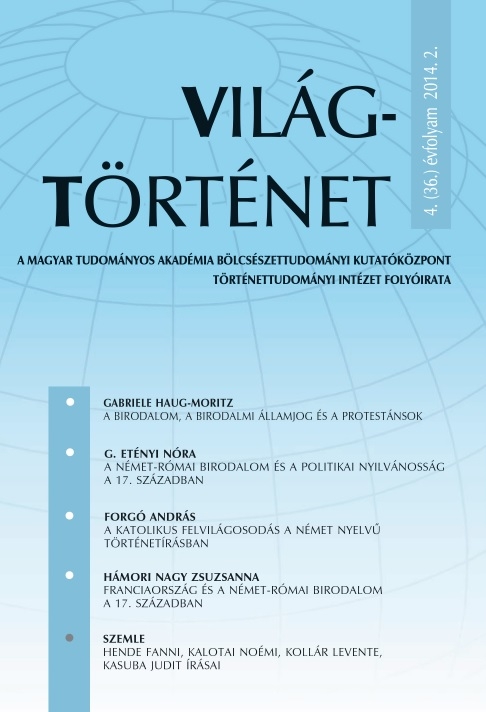A birodalom, a birodalmi államjog és a protestánsok
The Empire, the Imperial State Law and the Protestants
Author(s): Gabriele Haug-MoritzSubject(s): 16th Century, 17th Century, 18th Century
Published by: Magyar Tudományos Akadémia Bölcsészettudományi Kutatóközpont Történettudományi Intézet
Keywords: Protestant Estates; imperial state law; Roman Empire
Summary/Abstract: The paper seeks to answer the following question: How did the political practice of the Protestant Estates change in the Holy Roman Empire under the influence of the developing imperial state law elaborated mostly by Protestant legal experts. The author presents three case-studies. At first she focuses on the Imperial Diet of Augsburg held during the Schmalkaldic War in 1550. In the second case she examines the debates on the implementation of the decrees of the Westphalia peace treaties around 1650. The third scrutiny sheds light upon a conflict between the Aulic Council and the league of the Protestant Estates, known as Corpus Evangelicorum, which took place subsequent to the War of the Austrian Succession in 1750. The analysis demonstrates the underlying difference between the examined eras. Despite the diminishing imperial influence, the model of a Catholic Empire headed by the Emperor was not questioned during the 16th century. From the beginning of the 17th century, however, imperial state law, elaborated predominantly by Protestant legists and supported by the Protestant Princes, had already queried the leading role of the Emperor. The common political stand of the Protestants, which had grown strong after the Peace of Westphalia, resulted in a more and more powerful interpretation of the Empire that derived from the Catholic understanding essentially. The struggle between the two conceptions led to the gradual paralysation of the political system from the mid-18th century, which finally contributed to the dissolution of the Empire as well.
Journal: Világtörténet
- Issue Year: 2014
- Issue No: 2
- Page Range: 191-202
- Page Count: 12
- Language: Hungarian

